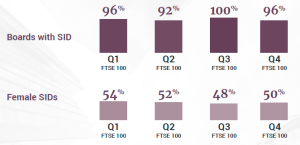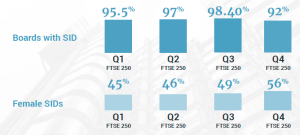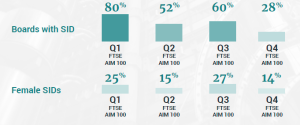Partly because of the high-profile failures of Equitable Life and Marconi, the concept of the Senior Independent Director (SID) role was first introduced in 2003 in the Higgs Review of board effectiveness, which recommended that boards of publicly listed companies should appoint a SID from their Independent Non-Executives.
It was recommended that the SID ‘should attend regular meetings of management to develop a balanced understanding of the themes, issues, and concerns of shareholders, communicate these views to the non-executive directors and, as appropriate, to the board as a whole and ‘should be available to shareholders if they have reason for concern that contact through the normal channels of Chair or CEO has failed to resolve’.
Despite initial concerns that the role would weaken the role of the Chair, the SID has become generally accepted and recognised as a playing a key part in ensuring a successful non-executive board and was included in the Financial Reporting Council (FRC) UK Corporate Governance Code in 2018. In 2024 96% of FTSE 100 boards include a SID.
In 2022, the FCA published a requirement that at least one of the four senior board roles (Chair, SID, CEO and CFO) should be held by a woman. Whilst there has been some increase in the other roles since 2019 (at the end of 2023, FTSE Women Leaders Review reported that 24% of FTSE 100 organisations included a female CFO, 18% a female Chair and 11% a female CEO) the most significant improvement had been in the SID role, with 47% of FTSE 100 organisations reporting a female SID.
Miles Advisory’s inhouse updated research shows that in May 2024, parity has been exceeded, with 51% of FTSE 100 boards including a female SID.
96% of FTSE 100 Boards include a Senior Independent Director. 51 % of FTSE 100 SIDs are female. Breakdown by quartile:



Whilst the SID’s brief is often less clearly defined than that of other board members, the intermediary aspect of the role is well recognised, with strong relationships with Chair, other directors and shareholders being vital to success. Large institutional shareholders are typically most engaged, but the SID should seek to build relationships with all shareholders and are often the conduit for feedback on the organisation’s strategy and so should take measures to be visible to and trusted by key stakeholders.
During ‘business as usual’ the SID should be proactive, playing a key role in ensuring board effectiveness – acting as confidant to the Chair, helping to build a positive relationship with the board, monitoring the dynamics between Chair, CEO, NEDs and shareholders, and providing support and advice on delivering the strategic plan. The SID acts as a ‘critical friend’, communicating sometimes alternative views and perspectives when necessary and evaluating the Chair’s performance. FRC Board Effectiveness Guidance stating the SID should meet with non-executive directors and without the Chair at least once per year to appraise the Chair’s effectiveness and that they should participate in external board reviews.
Following the FRC Guidance suggesting the SID should chair the nomination committee during the Chair appointment process, this has become increasingly common practice, and so the role has a key part to play in succession planning, including being the point of contact for any concerns.
In addition, the SID increasingly takes the lead on ensuring the whole board including the Chair are representative of the culture and the corporate values of the organisation and the business’ broader ESG objectives.
The SID role takes on increased prominence and importance in times of change and crisis. Should the board or shareholders determine that the Chair’s performance makes it necessary for them to stand down, the SID will play a key part in facilitating the process often leading on persuading the Chair to leave. If the Chair becomes unwell or unable to fulfil their role for a period, the SID would be expected to assume the Chair role on an interim basis or lead the NomCo to appoint another NED to do so. The SID would also be expected decide if it would be in the best interests of the company to appoint a permanent replacement.
During periods of stress, the SID is expected to work with the Chair and other directors and/or shareholders to resolve significant issues and often lead crisis communication to shareholders, executive committee and the wider public. The 2018 FRC Corporate Governance code provides some examples of issues which should trigger SID involvement:
The SID will also play an instrumental part during any sale or IPO process, mediating across all parties and managing expectations and relationships to avoid conflict and to enable outcomes for benefit of all stakeholders.
The SID role is not without intrinsic potential conflicts. As a recognised route to a Chair role, the SID will need to act with the utmost integrity in assessing Chair performance and providing appropriate support and advice and in mediating during times of change and crisis. The main routes to SID roles remain general management and finance but a successful SID will need a sound understanding of all areas of business and enough professional weight to quickly gain trust and be an effective critical friend to the Chair.
The SID may be the most recent addition to the boardroom but with emergent technologies, changing expectations from shareholders and broader society, regulatory changes and an ever-increasing focus on purpose and ESG all contributing to a sustained period of significant change in the UK boardroom, the successful SID will continue to play an essential role in ensuring board effectiveness.
Deborah Cooper, Partner and Head of the Board Services and Financial Services Practices observes:
‘The SID is firmly embedded in larger listed companies and the value of the role is increasingly recognised as essential to great governance including reinforcing a culture where all including the Chair are given feedback.
We are seeing an uptick in SIDs sitting on the boards of privately owned organisations and mutuals, particularly those whose NEDs also sit on listed boards. The increase in female SIDs is very encouraging and should provide impetus for a renewed push towards gender parity in the other ‘big 4’ roles of Chair, CEO and CFO. Considered succession planning and inclusive search processes will be key to progress.”